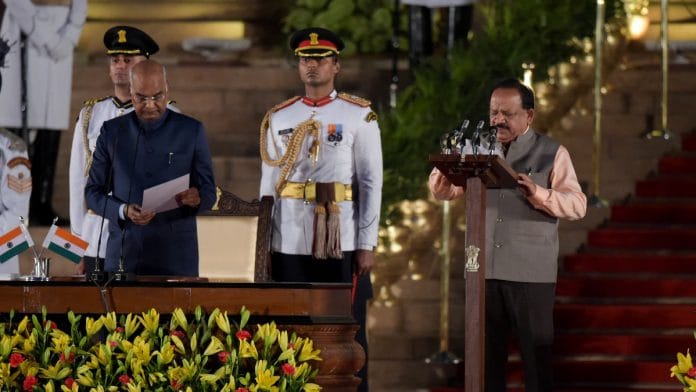New Delhi: Dr Harsh Vardhan, an ENT specialist and MP from Delhi’s Chandni Chowk, has been chosen as the new minister of health and family affairs in Prime Minister Narendra Modi’s new cabinet. Jagat Prakash Nadda had held the portfolio in the outgoing cabinet.
The previous Modi government’s focus on healthcare initiatives was among several that possibly helped the BJP storm back to power. Modi himself had said in his victory speech on the evening of 23 May that his government’s work for ailing Indians had borne fruit.
“This is not my victory or the BJP’s victory alone. It is the victory of citizens who aspire for an honest government… For the sick, who wait for years to save money to seek treatment and who are now covered by Ayushman Bharat,” he had said.
Also read: Modi cabinet: Here’s the full list of who got which ministry
Challenges awaiting new government
Shortage of specialist doctors: Government healthcare centres in rural areas are struggling because of an acute shortage of specialist doctors. According to the Rural Health Statistics 2018, 74 per cent of all sanctioned specialist doctor positions are lying vacant in community health centres (CHCs) across the country, including surgeons, gynaecologists, physicians, and paediatricians.
Strengthening Ayushman Bharat: The world’s largest healthcare scheme, Ayushman Bharat, needs to bring more private hospitals within its ambit. In April, around 15,000 hospitals were empanelled under the scheme, with half of them being privately handled, but still insufficient to treat the scheme’s 50 crore beneficiaries.
The government also envisions wellness centres as one of the “base pillars” of the scheme, but only around 8,000 were operationalised till April — a mere 5 per cent of the 1.5 lakh promised.
Launch of Medical Device Regulation Bill: There was a huge controversy over Johnson & Johnson’s faulty ASR hip implants, which meant that more than 4,000 people were fitted with life-threatening medical devices. Now, the government needs to tighten regulation of the medical device market in India. The latest proposal calls for the government to deploy 754 officers, specifically to regulate medical devices.
Achievements of the last 5 years
Launch of Ayushman Bharat: Touted as the world’s largest free healthcare scheme, Ayushman Bharat envisions providing around 50 crore poor people with health insurance worth Rs 5 lakh every year.
Launch of National Health Policy: In March 2017, the Modi government had launched the National Health Policy, which proposes to increase health expenditure from 1.15 per cent of the gross domestic product to 2.5 per cent by 2025. Effective implementation of the policy could play a key role in fulfilling the BJP’s manifesto promise of universal health coverage.
Bold targets for TB eradication: The government aims to rid India of tuberculosis by 2025, five years before the target set under the UN Sustainable Development Goals. The funding for control and treatment of TB has increased by over 300 per cent in the last three years.
Also read: New TB cases in India shot up by 16% in 2018 – but that’s not bad news
The outgoing minister
The outgoing minister of health and family welfare, Nadda, will be credited with the national rollout of Ayushman Bharat, under which the government has treated more than 10 lakh people free of cost since September 2018.
However, his ministry made some serious goof-ups too. For instance, Nadda, in February 2018, had announced the formulation of the policy while marking ‘World Rare Disease Day’. But soon, the ministry made a U-turn after realising that health is a state subject, and that “concurrence of most of the states had not been obtained”.
The government was also unable to strongly respond to the allegations raised by the US about the low quality of Indian medicines. In the latest annual ‘Special 301 Report’, the US has blamed India for its growing problem of spurious and fake medicines.
While the government has rejected allegations outright, the US has continued to highlight the lapses in the manufacturing of India-made drugs.






